
Ask DadPad, Health & Wellbeing, Long Read
Ask DadPad: Healthy eating and healthy lifestyle tips for new dads
Posted on 2nd October 2020
Becoming a new dad is a great excuse to tackle all of those good intentions around healthy eating and living a healthier lifestyle that you’ve never actually got round to. Not only are you now having to ensure that you stick around for a good few years to help this little one grow, develop and learn all that she needs to know, but you’re also going to need more energy to keep up with her, demonstrate good habits to also give her the best start, and make sure that nothing in your own lifestyle is going to have a negative effect on her.
Think about your diet, alcohol consumption, and how much you exercise, along with any other ‘bad habits’ that you might have: is now a good time to find the motivation to make those changes that you’ve been meaning to do for years?
To help you, we’ve spoken to some good friends of ours – all of whom know their stuff in terms of healthy eating and lifestyles – in order to give you the key tips on how to make a positive change (find out more about our team of experts – Rob and Sam from Cornwall High Performance; Sean from The Cornish Cricket Company; and Ken, a qualified personal trainer – at the bottom of the page). We’re also going to share with you some other good sources of information and advice to help you and your family live your best lives.
It’s a particularly good time of year to think about these things. Last Wednesday, for example, was National Fitness Day, which aimed to raise awareness of the importance of physical activity to help us all lead healthier and more active lifestyles.
This week is the British Nutrition Foundation’s Healthy Eating Week, setting daily challenges for us as follows:
- Monday – eat more wholegrains
- Tuesday – vary your veg
- Wednesday – drink plenty
- Thursday – move more
- Friday – be mind kind
- Saturday – get active together
- Sunday – eat together
We’ll look at some of these challenges in more detail as we work our way through this blog post.
Finally, it’s also the start of #Stoptober, when the NHS encourages smokers to take up their 28-day stop smoking challenge.
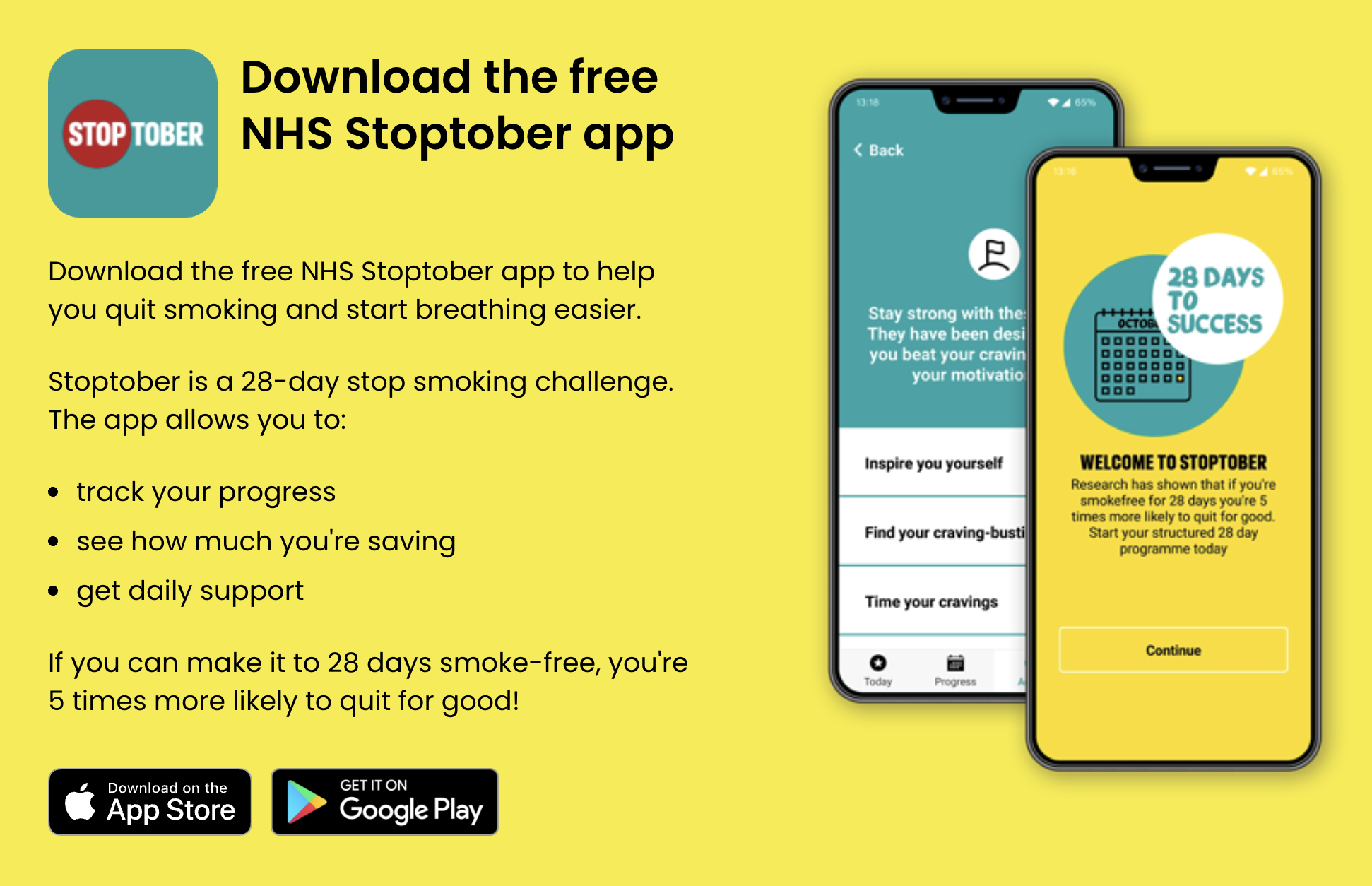
Before baby arrives: Stop smoking
Protecting your baby from tobacco smoke is one of the best things that you can do to give your child a healthy start in life. It can be difficult to stop smoking, but it’s never too late to quit. If you smoke around your unborn baby, this can restrict your baby’s growth, cause baby to be born too soon, and increase the risk of Sudden Infant Death Syndrome (SIDS, or cot death). If baby’s mum smokes, she can get support to quit from her midwife. Alternatively, there are lots of sources support via the NHS for both of you, including:
- NHS Stoptober initiative – including a link to the NHS Stoptober app
- NHS Stop smoking in pregnancy webpage
- NHS Change4Life Smoking in pregnancy webpage
- NHS Local Stop Smoking Services information
- NHS Smokefree helpline – 0300 123 1044 (available 9.00 am-8.00 pm Mon-Fri, 11.00 am-4.00 pm Sat-Sun)
Before baby arrives: Eating healthily
When talking with our expert contributors, we began by asking them for the key advice that they would offer to a dad-to-be and his partner who haven’t really got to grips with healthy eating until this point in time.
Rob and Sam at Cornwall High Performance started off with some good, basic advice: “Read around the subject. There’s a lot of confusing info out there. Make small changes slowly, bit by bit, remembering that Rome wasn’t built in a day. New habits are built by repetition – the more we do something, the bigger the likelihood that it will become a habit… good or bad.”
Ken also recognised that this point of time in your lives is the best time to look to make that change: “Nutritious food is key – as it should be at all times, but even more so now – so that you can both keep your health as optimal as possible during this challenging time.”
Sean provided a helpful overview of how to eat healthily: “Cut out sugar, reduce carbohydrate intake, drink lots of water and cook meals from scratch.”
However, knowing that that’s what you should be doing is one thing, but knowing how to achieve it is another! Here’s where we’re hoping to help…
Avoid processed foods
Our contributors were all of one voice when it came to processed foods. The CHP team advise us to: “Cut out snacks that man has created and which come wrapped in shiny wrappers. Processed food is more often than not lacking in vital macro and micronutrients that support health within the body“, with Ken adding that “it is important to try and minimise processed foods as much as possible, to minimise the negative impact they can have on your health.” Sean also recommended that you look to “forget processed ingredients and foods.”
Focus instead on real food
All our contributors emphasised the importance of focusing on and eating ‘real’ foods wherever possible. This means focusing around eating:
- Vegetables
- Fruit
- Protein-based foods – meat, fish, beans and pulses, nuts and seeds
- Natural fats – eggs, milk, cheese, butter, ghee, coconut oil, avocados, nuts and seeds
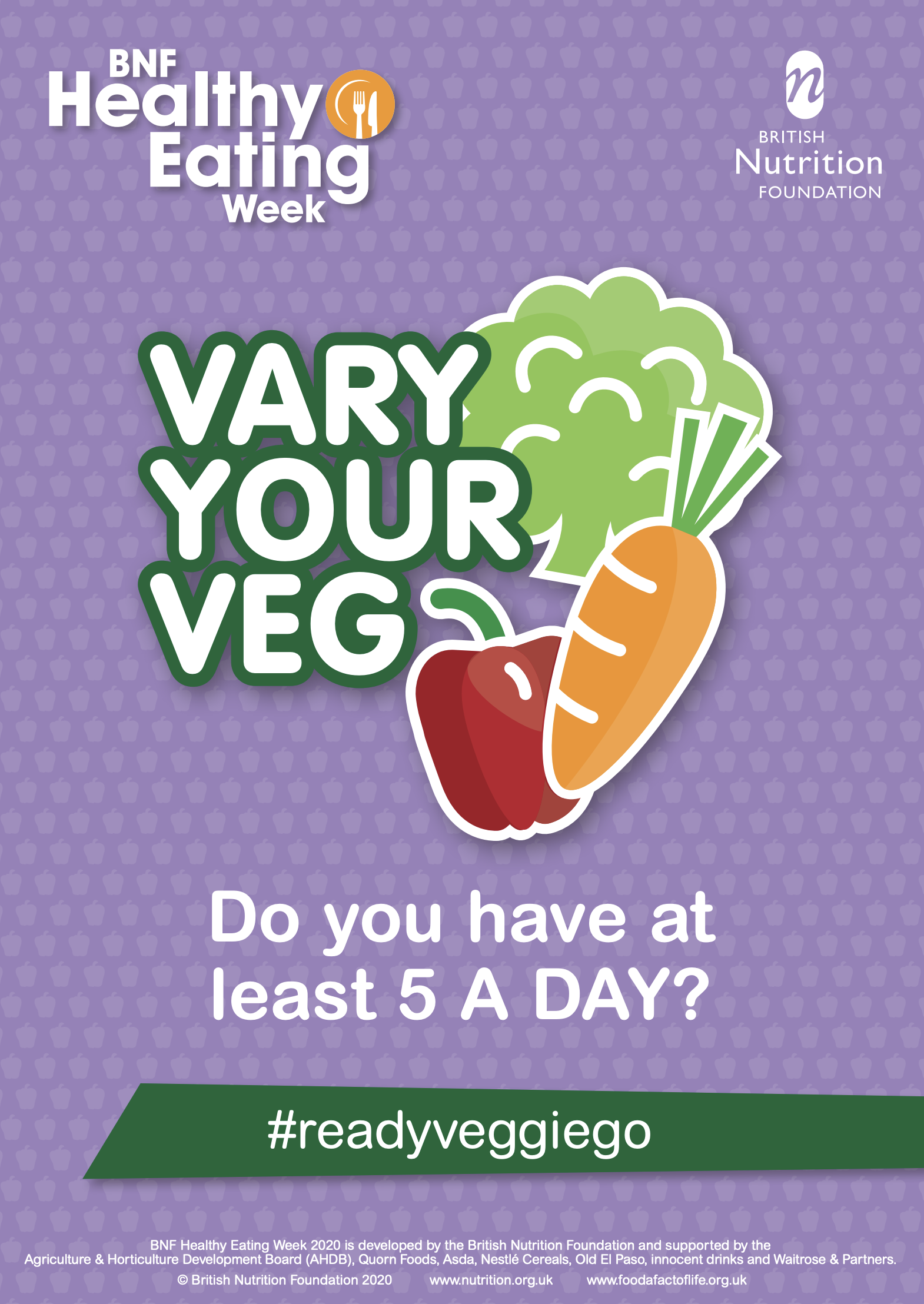
#readyveggiego
The BNF Healthy Eating Week challenge for Tuesday was to seek to #varyyourveg. Their supporting poster provides information on why vegetables are important (for example, as well as providing a range of important vitamins and minerals, they provide fibre, which is essential for a healthy digestive system and also helps to reduce the risk of certain conditions and diseases). There’s also info on what a portion size looks like, to help you properly achieve your five-a-day, and ideas on how to try and include more veggies in our diets – e.g. adding vegetables to dishes such as spaghetti bolognese, curry, soup or cottage pie – here at DadPad, we often add lentils, peppers, carrots, peas (or basically anything that we’ve got left kicking around in the bottom of the fridge!) into these meals; adding into smoothies; eating as snacks – carrot sticks, celery sticks, or slices of pepper are a much healthier alternative to chocolate, biscuits or cake when you need an energy boost; and using frozen or canned vegetables, alongside fresh vegetables.
You can also find out more about getting your five-a-day via the NHS Change4Life website , and there is also some great info on healthy eating during pregnancy on the NHS Start4Life website which looks in particular at the food groups that mum should avoid, as well as those which she should ensure that she is including. Their key advice is that, when aiming for a healthy diet in pregnancy: “You don’t need to spend lots of money, or go on a special diet – you just need a balance of the right types of food.” The British Nutrition Foundation also have a section of their website dedicated to information on Nutrition for Pregnancy.
Avoiding sugar spikes
Another recommendation from Sean is to “eat a diet that keeps your energy levels constant, rather than getting an insulin spike from sugar and carbohydrates.“
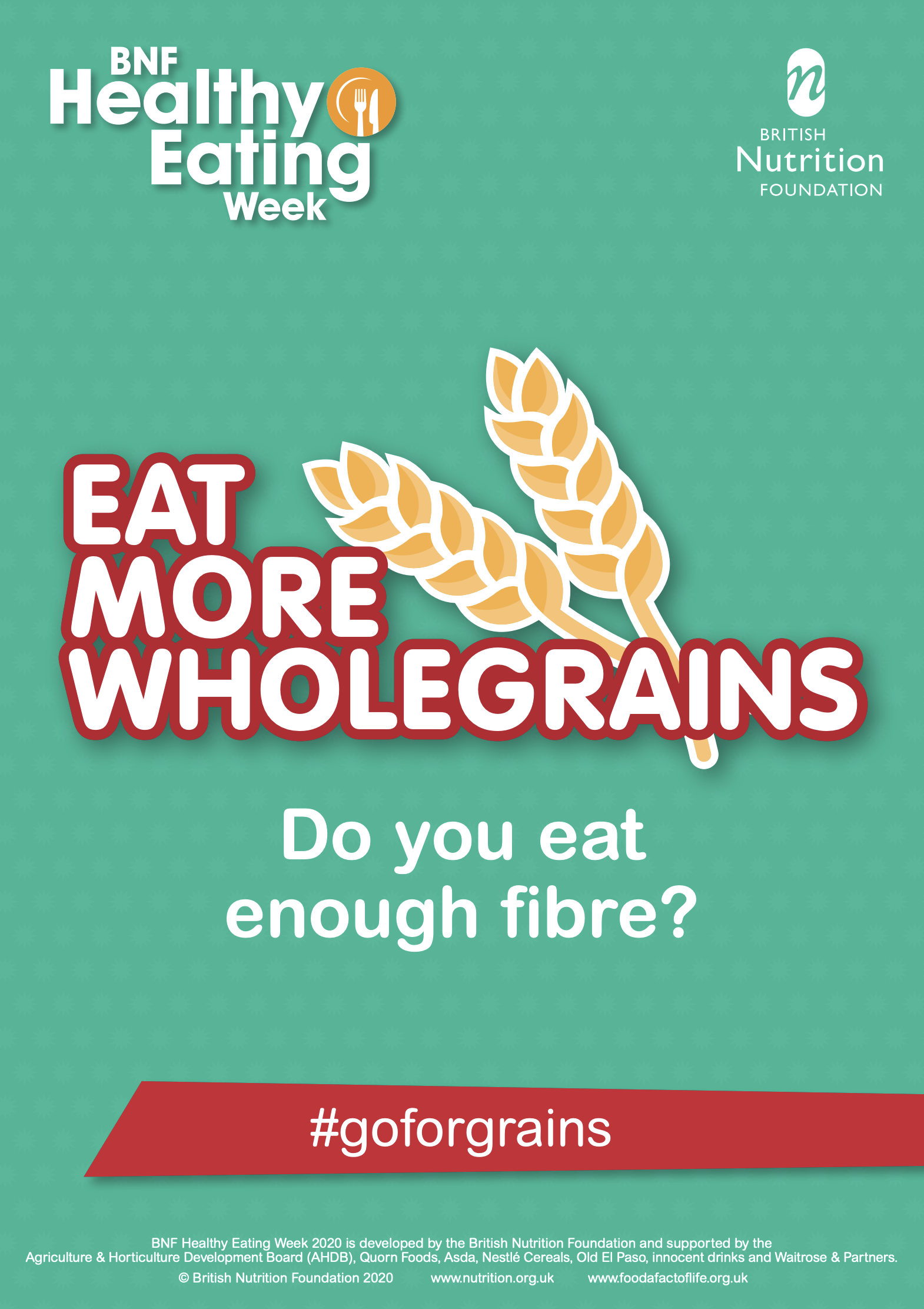
#goforgrains
The first challenge of the 2020 British Nutrition Foundation’s Healthy Eating Week was to eat more wholegrains – this means things like porridge oats, quinoa, pearl barley and bulgur wheat, as well as choosing wholemeal bread, wholemeal pasta and brown rice rather than their ‘white’ alternatives. Wholegrains help increase our fibre intake – important as most of us aren’t getting enough – as well as providing us with essential vitamins and. Wholegrain foods are also ‘low GI (glycaemic index)’ foods, which means that our body takes longer to break them down, preventing spikes in our blood sugar levels and generally helping you to feel fuller for longer.
Getting organised
Obviously, making the change to a healthier diet can feel like a lot of hard work, that you might not have the time or energy for. However, Ken has some great tips on this:
KW: “Plan your weekly meals and shop accordingly to help you keep on top of healthy eating as much as possible and reduce food waste. Batch cooking also helps for when time is at a premium, freezing meals for later use when you may not have the time to cook a healthy meal from scratch.”
To help you with planning, you might want to have a look at the free Change4Life app, produced by Public Health England. Alongside a huge range of healthy recipes, the app includes a useful meal planning tool.
Enjoying your food
The final advice on healthy eating from our contributors includes paying attention to portion size and keeping treats to ‘now and again’ – you don’t have to give things up completely; just ensure that they become ‘treats’ rather than an everyday essential. You should also avoid eating standing up or on the go; instead, try to eat your food ‘mindfully’. In relation to this, Ken suggests always eating your meals at a table, rather than in front of a screen, which can help you begin to gain a better understanding of how different foods make you feel.
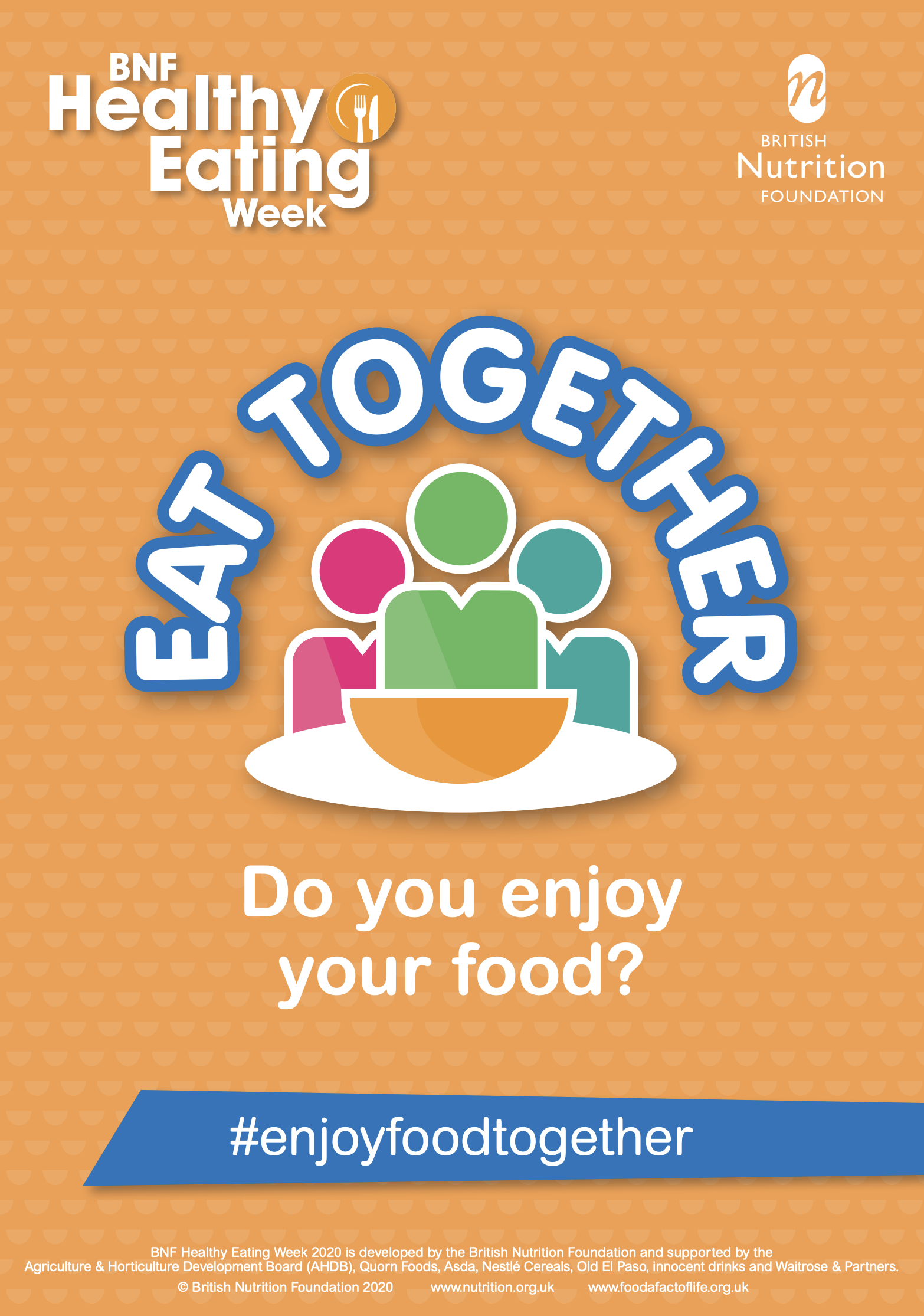
Eat together
The Sunday Health Eating Week 2020 challenge set by the British Nutrition Foundation was to #enjoyfoodtogether. Obviously, under the current Covid-19 restrictions, eating with people outside of our household may not be allowed or advisable, but this does not mean that as individual families we cannot still take up this challenge – and it’s a great one to continue as your children, and family, grow. The BNF identifies some of the benefits of doing this, including: providing motivation for eating more healthily and trying new foods; developing self-esteem and social skills; being beneficial to our mental health; and minimising distractions (such as the TV) which can delay our hunger cues and encourage us to eat more than we actually need.
Keep healthily hydrated
As well as eating healthily, it’s important to ensure that you are drinking enough:
KW: “Ensure you keep well hydrated too, with water being the best choice (ideally filtered), adding a squeeze of lemon juice if you prefer something more flavoured. This is most important first thing in the morning as your body has dehydrated overnight, so be sure to rehydrate when you get up!”
Again, this is something that the BNF have flagged up:
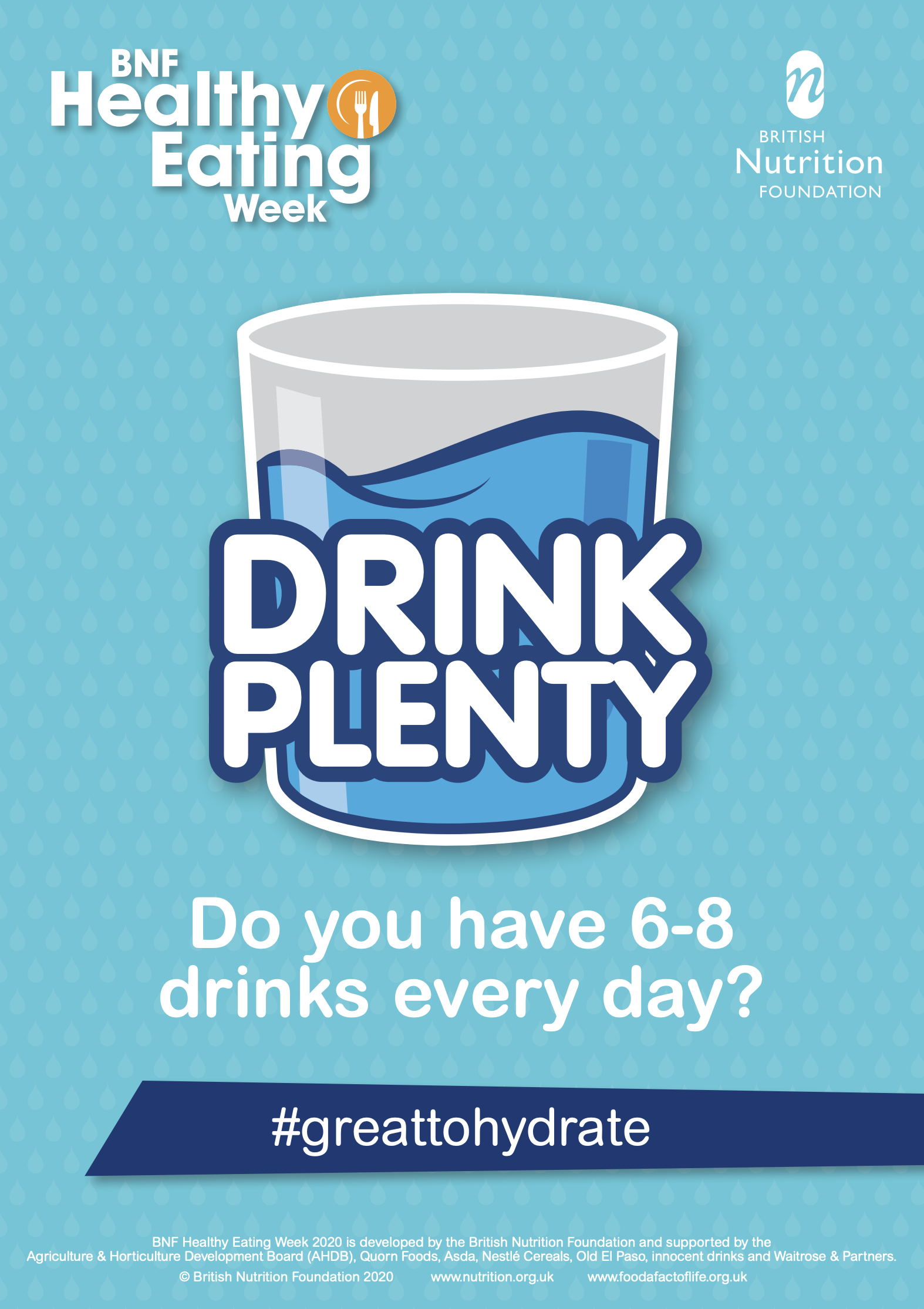
#greattohydrate
Wednesday’s challenge for Healthy Eating Week was to #drinkplenty. Together with advice on appropriate intake levels, they also include information on the healthiest drink options and tips on how to stay hydrated – such as keeping a reusable water on hand throughout the day. Their challenge is to aim to have at least 6-8 unsweetened drinks a day.
Watching your alcohol intake
If we’re talking about drinking, then we also need to touch upon alcohol. The team at CHP advise that – like treats when eating – alcohol should ideally be treated in the same way… sparingly.
The current recommendation for adults – in order to keep health risks from alcohol to a low risk – is to drink no more than 14 units per week, to spread your drinking over three or more days if you regularly drink as many as 14 units a week, and to aim to have a few alcohol-free days each week.
If you’re unsure whether you’re drinking more than you perhaps should be, it’s worth having a look at helpful online tools, such as Alcohol Change UK’s unit calculator.
As drinking alcohol can cause damage to an unborn baby, the advice is that it is safer for women not to drink any alcohol during pregnancy. The NHS Change4Life website explains the reasoning behind this recommendation in a bit more detail, but now might be a good time for both you and your partner to at least cut back on, if not completely give up (even if just for a while), drinking alcohol. Again, as with stopping smoking, there are some great support services and sources of information available:
- NHS Tips on cutting down webpage
- NHS Alcohol support webpage, including links to support groups such as Alcoholics Anonymous (AA) and SMART Recovery
- Drinkline (national alcohol helpline) – 0300 123 1110 (9.00 am-8.00 pm Mon-Fri, 11.00 am-4.00 pm Sat-Sun)
Getting fit for fatherhood
As well as making positive changes to your diet, impending fatherhood might also start you thinking about your fitness and activity levels. We asked our team of experts what advice they’d give to a dad-to-be looking to improve his fitness.
Sean recommends that you should look to undertake exercise “regular and often, as it will help you to cope physically and mentally with the tremendously tiring phase you are about to enter – endurance is key!“.
Ken added: “Physical activity is vitally important for overall health and wellbeing, and should be managed carefully during this challenging time. Becoming a dad will have an impact on the time that you have to train and also on how you feel (fatigue, low energy levels, etc), so don’t put too much pressure on yourself to try and improve your fitness levels too much, as this could lead to increased fatigue and stress levels, as well as potential injury and illness.”
The latter point is excellent advice. It’s all too easy – if we’re suddenly feeling motivated to make a change, but are distinctly out of practice and/or shape! – to rush in with enthusiasm, and end up doing more harm than good. The standard guidance is of course to always to check with your GP before undertaking any change in lifestyle or fitness, and the CHP team also suggest that, if possible, you look to “find a good gym or coach (if knowledge here is lacking) and learn to move well, move often and lift weights.” Ken adds that, for those who are new to exercise, you should “either look online or consult a professional for some ideas on how you can maintain or improve your fitness safely, appropriately and effectively.”
Keep it simple – don’t overcomplicate
Ken suggests that you should: “Focus on keeping it simple and doing the best you can, remembering that any activity counts! Go for a walk, short run or bike ride for some cardio workouts and, for some strength and conditioning, add some simple body weight exercises throughout the day, which can be done at home, without the need for equipment or to have to go to the gym.”
Again, the CHP team agree: “People like to overcomplicate exercise. Focus on keeping mobile, lifting weights and run/bike/swim etc. Twice a week will do, if structured well, and sprinkle in some cardio/conditioning to tune up the heart and lungs and to expend some calories, if needed.”
If you’re not sure where to start, and can’t access a local gym or coach for some initial advice, a great place to go for information is the NHS Get fit for free webpage. This states that: The secret to getting fit for free is to use every opportunity to be active. Ideas that they provide include:
- Walking everywhere
- Using their Couch to 5K free running plan – aimed at complete beginners
- 5-week Strength and Flex workout plan – with a free, virtual trainer
- Cycling
- Stair climbing
- Park games with children
- Home exercises – which include 10-minute home workouts and gym-free workouts
- Skipping
- Outdoor gyms
Baby’s here!
The next thing that we talked about with our contributors was the health and fitness priorities for a new dad looking to help him and his partner adapt to the massive change that’s just taken place in their lives, alongside all the other adjustments and challenges that they will be facing over the coming weeks and months.
Importantly, as Ken reminds us: “Managing stress during this time is key! Don’t take on too much and give yourself time to adjust to the new arrival and all the changes that they bring.”
A suggestion from Sean is to: “Try to get working routines in place in terms of sleep, exercise and healthy eating.”
This is where putting some positive changes in place before baby’s arrival will start paying dividends, because the recommendation from the CHP team is that you should simply aim to carry on with the changes that we’ve already outlined above: “Prioritise a healthy diet, where possible, as this will improve so many aspects of general health. Eat regularly, and control your portion size; avoid processed food; choose whole foods and vibrant colours; and drink plenty of fluids (water) – aiming for around 1 litre per 25kg of body weight per day, depending on activity levels.”
Ken reiterates the same points, advising new dads to “prioritise good nutritious food and hydration as much as possible.”
Sleep…
Clearly, one of the biggest struggles for all new parents is a lack of sleep. We asked our experts for their advice on this.
Ken advises that you focus “on achieving the best sleep routine you can (and grabbing naps when night times don’t always go to plan). Keeping screen time to a minimum in the evenings, minimising caffeine intake (especially after mid-afternoon), and keeping your bedroom cool, calm and tidy can all help with sleep routines for both parents and the new arrival. Also, be sure to get plenty of fresh air and good amounts of sunlight, especially in the morning, to help with circadian rhythms. This will all help with the newborn, too, so all going out for a morning stroll, ideally in a natural environment, will make a big difference!“.
CHP add: “Try and organise a sleep pattern for all (although this is not always possible with a baby). Where sleep is distorted, allow an earlier “lights out” than normal to allow for this, and – where possible – a short nap during the day is advantageous. By ‘short’, we mean just enough time to drift into a deep sleep (around 10-20 minutes). You then need to wake yourself up as any more can be detrimental to your normal night-time sleep.”
We especially loved what Sean had to say on this point, reminding us that both mum and dad will be suffering from a lack of sleep: “Plan and organise as much as possible to gain sleep. You need to be part of the solution, if possible, and not a sleep deprived part of the problem.”
There’s more info on surviving without sleep in our blog post from July.
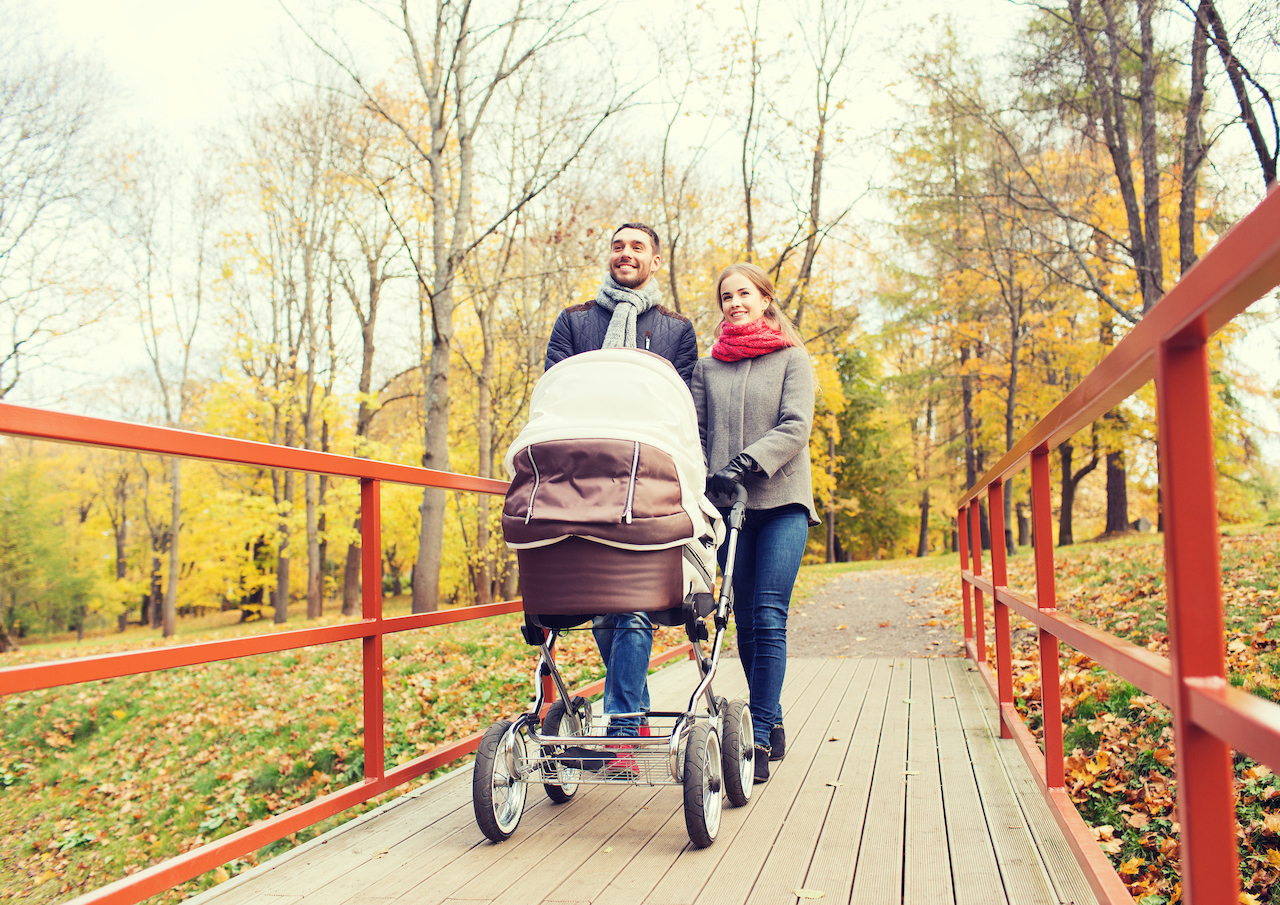
Keeping active
Again, especially in the early days, when all your efforts will be going into looking after your little one effectively 24 hours a day, it can be difficult to even contemplate any sort of physical activity. However, as Ken has suggested above, a daily walk can definitely help the whole family start establishing a good sleep routine (and it also has benefits for your mental health too, which we’ll look at in a bit). He advises that you “just do the best you can – small and often, ideally, depending on how you feel and what time you have.”
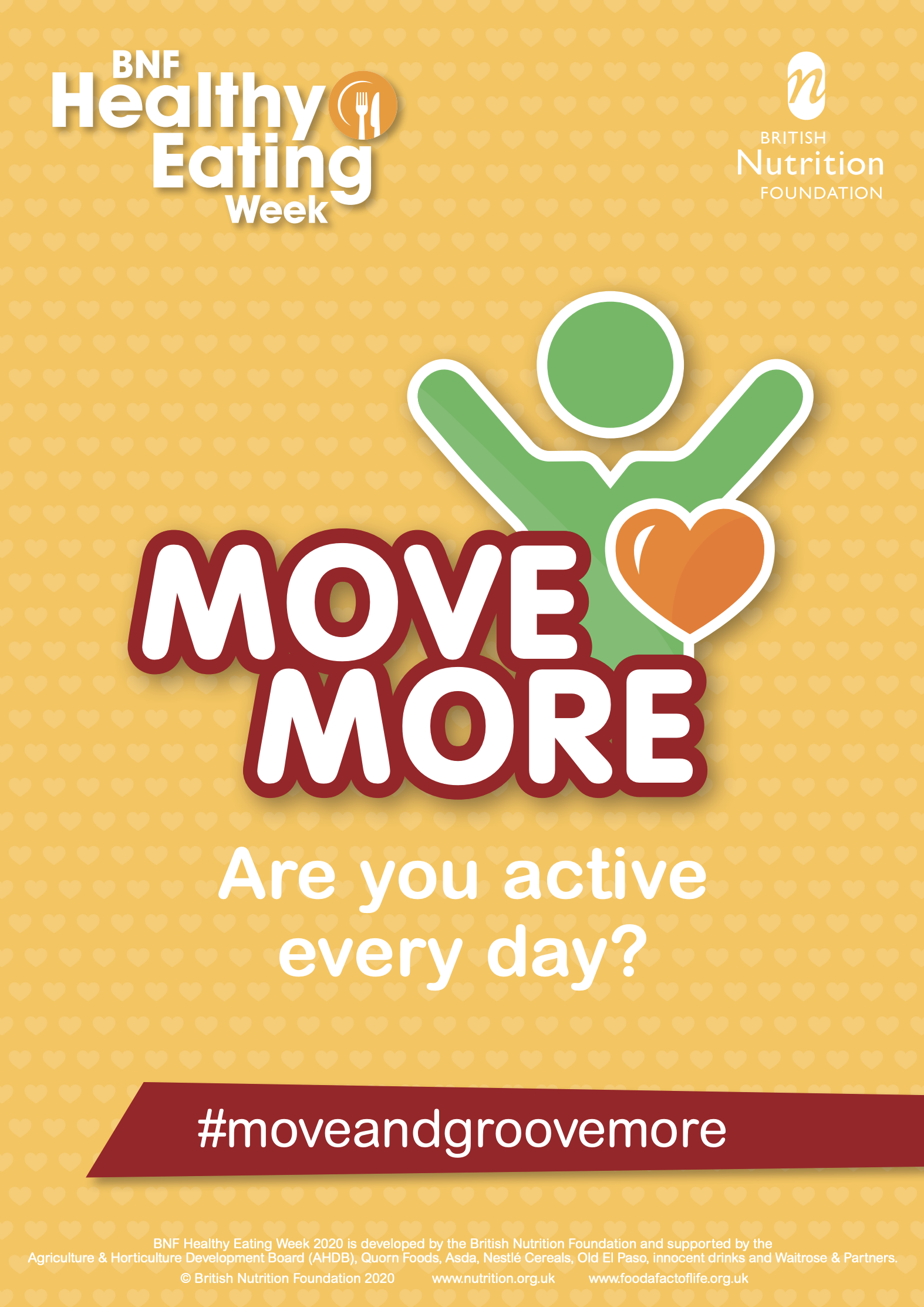
Move More
Yesterday’s BNF Healthy Eating Week challenge was to #moveandgroovemore. Their challenge poster (above) explains some of the benefits of getting active, different levels of activity, and the recommended weekly amount of activity for different age groups. For adults, we are encouraged to: have at least 150 minutes of moderate activity, or 75 minutes of vigorous activity, per week; and to do muscle strengthening activities on two or more days per week.
Finally, here, some brilliant advice from Sean, if you’re planning to go on any sort of trip, adventure or even just a walk with baby in tow, is to “allow more time to get out of the house than you could ever imagine!“.
Supporting mum with breastfeeding
Obviously, back in August, we provided you with lots of ideas of ways in which you – as a new dad – can support your partner in establishing breastfeeding. We included some practical tips – including suggestions with regard to keeping mum well fed and hydrated – and we asked our contributors for their suggestions in this respect, too.
CHP: “Bear in mind that the demands of breastfeeding on a female’s calorie needs is greater; some women expend up to approximately 500 kcals per day breastfeeding. It’s therefore important to prioritise meals with a good amount of the three main macros – protein, fat and carbs. Supplementation – in the form of zinc, magnesium and Vitamin D – but always check with your GP or Health Visitor first.”
Ken agrees, emphasising the importance of ensuring that “mum is able to eat real, nutritious foods… to make sure she maintains optimal health herself and can also provide maximum nutrition to the growing baby. Focusing on good sources of proteins and fats is key (fish, eggs, meats, coconut or olive oil, butter), whilst also providing a wide variety of fresh fruit and vegetables, all ideally from organic sources. Keep it simple, using real foods – keep processed foods to a minimum – and implementing strategies such as meal planning and batch cooking can help save time and ensure that you have healthy, nutritious meals more often than not!”
Sean suggests prepping and planning in advance, perhaps making up some “‘treats’ that are healthy, simple to eat, and which can be stored easily.” The NHS Breastfeeding and diet webpage has some great ideas for some quick and simple snacks for a breastfeeding mum.
Keeping mentally healthy
Clearly, as well as keeping yourself physically fit, it’s crucial to keep a good focus on your mental health, too. Lifestyle changes can help you, as a new dad, guard against and/or alleviate these.
The team at CHP commented that “research has proved that being active, healthy, fit, strong, etc can have a huge positive effect on mental health. The ‘feel good factor; is an immediate result from exercise or recreational activity. Energy levels can improve, and sleep patterns, too. It has also been shown to decrease stress, anxiety and depression.” The team shared with us a link to a useful article on ‘The Mental Health Benefits of Exercise‘.
Ken expanded on this: “Focusing on what you eat and drink – as discussed above – will have a massive impact on not just your physical health, but also your mental health, too. Managing stress is also key, so use appropriate levels of exercise (e.g. a gentle walk), stress reduction techniques (e.g. meditation, breathing exercises) and talking to friends and family for advice and support to help maintain a positive mental state.”
A lot of these suggestions are covered in the NHS webpage: 5 steps to mental wellbeing, which includes suggestions on how to incorporate the following suggestions into your daily life:
- Connect with other people
- Be physically active
- Learn new skills – this one might not be quite so manageable at this point in your life, although you could, of course, view becoming a dad as a very important ‘new skill’!
- Give to others – again, working alongside your partner as an engaged and connected co-parent, to care for and build a bond with your new baby could be covered by this one
- Pay attention to the present moment (mindfulness)
We included more ideas on how to help your own (and your partner’s) mental health during early parenthood in an earlier blog.
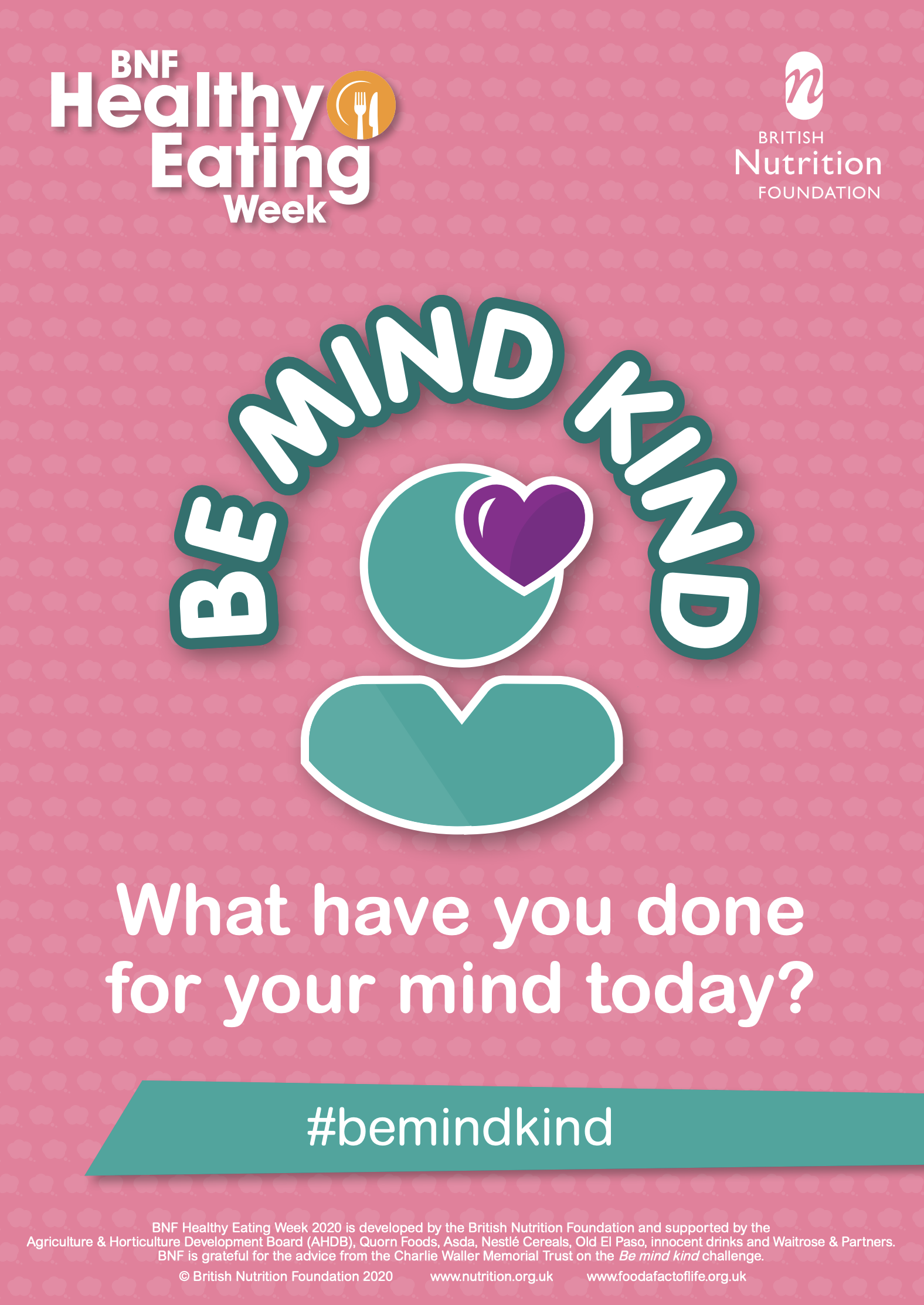
Be mind kind
Today’s Healthy Eating Week challenge is to #bemindkind, emphasising the benefits that eating a healthy diet, keeping physically active and having sufficient sleep can have. These aspects – all discussed in this blog post – can help support a healthy lifestyle, raising our self-esteem and boosting a positive mood. As we always advise at DadPad, the British Nutrition Foundation also encourage talking about our feelings with friends, family members or a health professional, in order to help us reduce our tension and worries, make us feel better, and help build stronger relationships to support in the future. Remember the importance of asking a new dad #HowAreYouDad, and always remembering to #AskTwice – we all know how easy it is to simply say ‘Fine’ when asked how we are, rather than admit our true feelings. Asking twice might make all the difference…
Be gentle on yourself
We thought a great way to end this blog would be to share with you some key pieces of advice from Ken and Sean for surviving those stressful and exhausting early days of parenthood and the huge life adjustment that they accompany…
SH: “Practice being grateful – the small things are so important – and try to find quiet time and great mates to talk to.”
KW: “Above all, go easy on yourself. It is a challenging time for you and your partner, and you are doing the best that you can!”
Further reading:
We’ve obviously included lots of links to further reading within this article, but here’s a summary of the main ones for you:
NHS Stoptober initiative – including a link to the NHS Stoptober app
NHS Stop smoking in pregnancy webpage
NHS Change4Life Smoking in pregnancy webpage
NHS Local Stop Smoking Services information
British Nutrition Foundation website
NHS Breastfeeding and diet webpage
NHS webpage with tips on cutting down on alcohol
NHS 5 steps to mental wellbeing webpage
Info on our contributors:
We are hugely grateful to our lovely friends – three of whom are experienced dads – who helped us by sharing their expertise for this article. They are:
Rob Smaldon and Sam Guy from Cornwall High Performance, a UKSCA Strength and Conditioning accredited company. Find out more via:
- cornwallhighperformance.co.uk
- Twitter: @cornwallhighper
- Facebook: @CornwallHighPerformance
- Instagram: @cornwallhighperformance
Sean Hooper: An experienced sports teacher and cricket coach with a BSc in sports science. Find out more about his business, The Cornish Cricket Company, via:
- thecornishcricketcompany.co.uk
- Twitter: @cornishcricket
- Facebook: @TheCornishCricketCompany
- Instagram: @cornishcricketcompany
Ken Walker: FdSc Personal Trainer; BSc Sports Performance & Coaching; CHEK Exercise Coach; SHEK Holistic Lifestyle Coach (Level 1).

